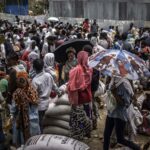Egypt has been intensely, and unprecedentedly, engaged in international efforts over the past few days. These endeavours are, by and large, the catalyst for Egypt’s restoration of its stature and global standing.
As threats contoured the country in the absence of neighboring armies that would join in warding off the repeated acts of terrorism, the political leadership had been actively involved in foreign talks with Jordan, Iraq, Lebanon, Libya, and the Palestinian leadership, offered Turkey and Israel the chance to adjust their course and put things right, and managed to absorb the lobbying campaign against it regarding human rights. Concomitantly, it was fighting for the Nile, brought the GERD crisis to the Security Council, and managed to obtain a Security Council resolution that deeply offended the Ethiopian side.
So, what would this activity accomplish? How can Egypt work in parallel to ensure safeguarding its rights and rights of sister countries while promoting its standing shortly? How is today different from the post-30 June period?
In formulating the New Republic’s foreign policy, the political leadership capitalized on Egypt’s history and geography being a country with the oldest border delimitations and a stable government. Verily, every attempt to leverage these capacities was logical and legitimate. Over the past seven years, Egypt adopted a foreign policy strategy that promoted its expansion building on the model it adopted and taking lead culturally and intellectually following a few decades of marginalization and decreasing influence during which it retreated into its internal problems.
Post-30 June Egypt awakened to these issues developed into time bombs impeding development through a series of large explosions that targeted the entire entity of the state. When the current political leadership assumed power, Egypt’s membership in the African Union was suspended and arrows from the West were hitting and impairing it, cashing in on the crisis and the critical time it was facing. Despite all of this, post-30 June Egypt managed to overcome this peacefully.
Post-30 June, Egypt anchored in introducing the public as a new variable in the equation and built on the Arab solidarity expressed by the UAE- and Saudi-led gulf rejection of the “hijacking attempts” of Egypt. Fruits of the political, security, and economic stability have been manifested repeatedly in Libya as has been evidenced by the respect for Egypt’s will and vision when it draw a red line for all actors and in Turkey’s examining the possibility of restoring relations with Egypt, a position to which Egypt responded by confirming that resumption of relations is contingent on abstention from harm and continuing taking steps that reinforce trust and prove actions louder than words and empty promises.
Sudan and Hamas provide good examples of a tangible and positive shift towards the Egyptian model. After a period of support for extremist movements, they made a course correction and ended up coordinating with Egypt and even identifying with the Egyptian position at times. On the Syrian file, Egypt’s vision prevailed and meetings between Egypt and Syria were convened for purposes of collaboration and information sharing. Furthermore, Egypt hosted the Libyan, Palestinian, and Lebanese peace talks. Obviously, Egypt is open to all factions, even the Shiite represented by Ḥarakat Amal [the Amal Movement] and its leadership.
In confronting the Islamist groups, Tunisia – and Sudan earlier on – drew inspiration form the Egyptian experiment, and took, in this respect, good and promising steps that won popular and international support. Another good indicator of the positive impact of Egypt was the Saudi Arabia approval of the Egyptian art and culture as a model to be adopted in Saudi Arabia after years of tightening, which contributed to a state of relief, created an enabling environment for attracting investment, and helped promote the image of Saudi Arabia worldwide.
Egypt-Jordan relationship – as has been the case with other Arab countries – seemed more harmonious and concerted, particularly in confronting the repeated Israeli aggression, exemplified by attacks on holy places, installation of security gates and cameras in these sites, and prohibition of prayer in the Temple Mount. In the recent Gaza War, Egypt’s vision prevailed and the Israeli aggression on Gaza was stopped in a record time by virtue of an Egypt-brokered ceasefire agreement that both parties honored.
Determinants of Egypt’s Foreign Policy
Determinants of the Egyptian role can be summarized in the following principles:
- Staying off tension and empty slogans and acting with deliberation, but with courage when needed.
- Avoiding sub-battles and focusing on the major battles and real danger.
- Countering the Turkish and Iranian expansion and the Israeli occupation.
- Knocking on every door to reinforce the joint Arab action at the political, economic, and military levels by promoting coordination between Arab countries, examining mechanisms for establishing a joint Arab army, and conducting a series of military drills and exercises to increase the military efficiency and exchange experiences. This joint Arab collaboration and harmonization was evident in the nature and level of the Arab representation at the inauguration of military bases of Mohamed Naguib, Berenice, and 3 July.
- Dealing effectively with dilemmas of the current Arab regional system relying on joint action, avoiding violence, containing all parties, improving public services, and affirming citizens’ right in having the national institutions confront terrorism and foreign intervention. The economic growth, stability of the exchange rate, and averting Covid-19 crisis with the minimum loss all helped strengthen and promote this role.
- Never leaving a vacuum for other parties to fill. That’s why Egypt’s New Republic donated $500 million for Gaza reconstruction and provided aid to Tunisia, Lebanon, Sudan and Djibouti. Also, the political leadership visited Baghdad despite the security warnings and the repeated attacks on vital targets and targeting of politicians and also met with the Israeli Prime Minister to urge him to revive negotiations and ease the blockade and collective punishment policies against the Palestinians.
The outcome of this entire endeavor was Egypt’s visions gaining respect in different arenas and Djibouti and Somalia correcting their voting policies and reversing their support for building a dam on the Blue Nile only a few months after expressing their reservation on the Arab resolution rejecting it, to end up supporting Egypt and Sudan in the face of intransigence of the Ethiopian side.
Constraints and Challenges
Egypt’s endeavors to restore its status and role is certainly –and will likely be – faced by obstacles, constraints, and challenges posed by parties that do not want Egypt to advance. Apparently, some internal forces in more than one country fear the return of Egypt’s role and are concerned about losing personal gains or being subject to accountability and comparability that will not count in their favor. Here comes the substantial role of the Ministry of Culture, Egypt’s State Information Service, the media framework, and drama and theatre in promoting awareness, scotching rumors and lies, and countering extremism and terrorism.
In this vein, a strategy needs to be drawn up in which concerted efforts go hand in hand, taking into account the Arab dimension and regional extension. Indeed, the idea of a modern Arab regional system hasn’t been the product of a political theory or an ideological doctrine. Rather, it came as a result of the development of the historically rooted cultural trends and human interactivity extending along the shores of the Mediterranean and trade routes from Muscat to Mecca and the Levant and from Yemen to Iraq.
Throughout history, Egypt harmonized with the region and its absence or invisibility created a wide and a deep cultural vacuum and strategic gap that political Islam filled. In parallel, Egypt’s success in overcoming and rejecting political Islam movements marked the first indication of the return of Arab awareness in –and to – Egypt.
In this connection, Bibliotheca Alexandrina can play a pivotal role serving as a launching point for many projects and ideas. Further, arrangements for establishing an “Arab Digital Society” in the Administrative Capital, Alamein, or Galala can be explored, to serve as a lever in keeping with the times at a reasonable funding.
As such, it would be instrumental to build an Arab regional order based on what has already been achieved, particularly the convergence of educational curricula that was made possible despite the presence of movements aiming at striking its cohesion and, thus, undermining stability of the region.
Egypt leaving the Arab field had unmistakably had its repercussions. Since the June 30 Revolution, Egypt came back to resume its natural role building on balanced well-thought-out steps that support stability and development, a powerful military, and well-informed public opinion.













